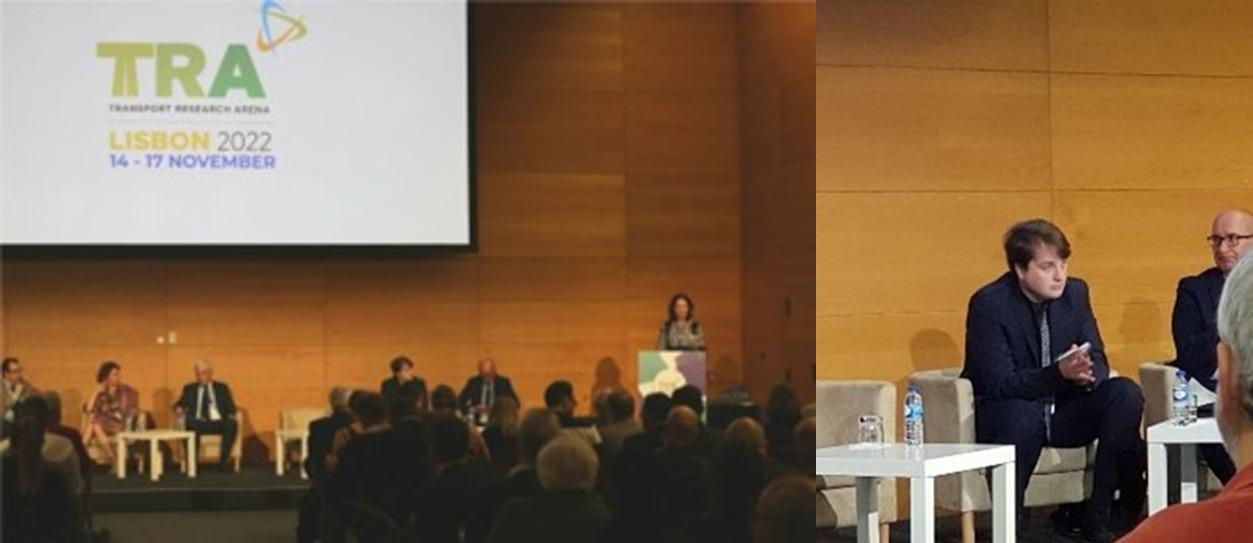Brussels, 16 November 2022

On the 16th of November, in the framework of the Transport Research Arena (TRA) in Lisbon, Waterborne TP and ALICE hosted a session on sustainable ports and airports.
The panel consisted of representatives from the EU Commission – Ms Rosalinde van der Vlies (Director of Clean Planet Directorate C, DG RTD) and Mr Marcel Rommerts (Heat of Unit – Transport Research, CINEA), the airport sector (Mr Massimo Corradi, SEA Group Milan Airports), Inge de Wolf, who presented the PIONEERS project on behalf of the Port of Antwerp-Bruges, Mr Ivo Cré (Director Policy & Projects, POLIS), and Mr Maarten Boot (Policy Advisor, FEPORT).
The discussion was moderated by Eero Lehtovaara (Head of Regulatory and Public Affairs, ABB Marine & Ports), in his function as Chairman of the Waterborne TP.
During the session, the key environmental implications for ports and airports of EU strategies and policies were discussed, such as the Green Deal, ‘Fit for 55’ and the Sustainable and Smart Mobility Strategy.
Participants were also invited to reflect on how their business or their company contributes to green operations in maritime ports, inland ports, or airports, while enabling the integration of waterborne and hinterland transport and logistics chains.
Rosalinde van der Vlies, Director of the Clean Planet Directorate C at DG RTD, in her intervention, addressed the environmental implications for ports and airports of EU Strategies and policies, while explaining how EU funding and programmes contribute to the development and expansion of sustainable business models in maritime and inland ports as well as airports.
Maarten Boot outlined the solutions FEPORT members are already deploying to green ports and the maritime logistics chain at large. FEPORT members are investing iin numerous solutions to green and optimize their operations, improve communications and coordination with other transport modes and facilitate modal shift,among others:
- Port call optimization, using digitalization and enhancing coordination with shipping and port stakeholders to reduce waiting times of ships, thereby improving capacity planning on the shore-side (at berth and on the yard) and hence reducing emissions and congestion in ports in the hinterland. Similarly, cooperation is ongoing with trucking companies to improve slot booking.
- Electrification of equipment, pushed by Non-Road Mobile Machinery Regulation and upcoming energy taxation directive revision, but a challenge is the current rise in electricity prices which is disproportionately penalizing companies that have already taken steps to green their operations. Mainly thanks to the electrification of equipment, some EU terminals have already obtained climate neutral certification and others have similar targets for this decade.
- Terminals use IoT and Big Data (obtained eg via sensoring of equipment) to optimize operations on the yard, detect bottlenecks and reduce congestion as well as reduce the maintenance costs of equipment. A good example is the iTerminals project which seeks to apply Internet of Things, Big Data, Artificial Intelligence, Cloud Computing, Robotics and Automation concepts in container terminals and includes pilot activities to demonstrate the proposed solutions.
Mr Boot also underlined that terminal operator and the transport sector at large can only implement sustainable solutions if they are able to remain competitive. It is therefore crucial to assess the impact of EU environmental legislation (such as EU ETS and FuelEU Maritime) and the rise of energy prices (most notably electricity) on the competitiveness of EU port terminals and take measures accordingly.
In addition, it is crucial to also support pre-competitive research and pilot projects that can be replicated at wider scale, which is the reason why FEPORT has supported the Waterborne Technology Platform since its establishment and appreciates the support of the DG MOVE and DG RTD in that regard.
Inge de Wolf (PIONEERS Project Coordinator, Port of Antwerp) presented the H2020 funded PIONEERS project which addresses the challenge for European ports of reducing GHG emissions while remaining competitive. In the context of the project, 19 concrete solutions are being implemented in the fields of port and terminal operations, intermodality, energy transition as well as improvement of passenger and cargo flows via digitalisation.













